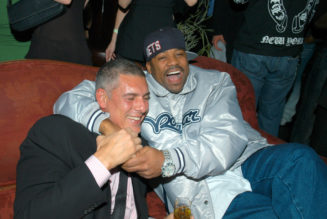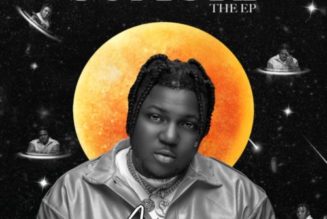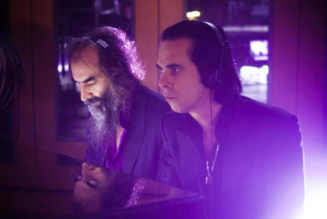
Black History Month is getting a lot more punk rock. Today sees the release of “Articulate at That Level,” a mixtape featuring musicians of color and/or women artists who are bona fide philosophers of rock. My band, Baby Got Back Talk, curated this playlist as a cross-section of the gnarliest noise emanating from today’s underground.
But make no mistake — the artists we’ve assembled aren’t tokens we scrounged up just to appease some fussy diversity, equity, and inclusion bureau. They represent the vanguard of alternative music in 2024.
Late last year, Lenny Kravitz made waves when he touted the importance of celebrating rock ’n’ roll music and history as a part of Black culture. It’s critical that “black artists are being recognized for their work in what is now being called non-traditional black music, which it is not,” the artist wrote on X. “Rock and roll is the music we were instrumental in creating and is a part of our history.” Releasing “Articulate at That Level” during the country’s time of collective reflection on Black legacies and futures is one step forward in the reclamation Kravitz advocates. You should support the artists on this mixtape mainly because the songs rip.
And as a bonus, if enough people spread the word, tastemakers won’t be able to claim there are no intellectually compelling women or artists of color in rock — unless they happen to be living under one.
The name of the compilation is a playful tweak of a comment that landed Rolling Stone cofounder Jann Wenner in hot water last year after he neglected to interview even one woman or one person of color for his book “The Masters.” Wenner defended his decision in The New York Times by saying he wanted to showcase “philosophers of rock,” and women and artists of color “just didn’t articulate at that level.”
To me, Wenner’s comments bore a not coincidental resemblance to Thomas Jefferson’s words in “Notes on the State of Virginia”: “Never yet could I find that a black had uttered a thought above the level of plain narration,” he wrote, “never even an elementary trait of painting or sculpture.”
Jefferson is a Founding Father. It stands to reason that an architect of the political structure we still rely upon today might also bequeath racial attitudes that continue to shape our moment, even in seemingly antiestablishment subcultures like rock ’n’ roll.
I like big music and I cannot lie
There are probably a billion largely unknowable reasons why I began to write songs. But I know for sure that one especially memorable episode of Nickelodeon’s “The Adventures of Pete and Pete” played a role. In the season 1 finale, Little Pete, a spunky tween ginger who has yet to develop his own taste in music, takes a shortcut home from school and stumbles upon a band practicing in a suburban garage. The song the band is playing changes Little Pete’s life. It speaks to him like no other music has, and he’s hooked. Unfortunately, he ambles away from the band playing in the garage without considering how he’d ever manage to hear his new favorite song again. It’s 1994, nearly 15 years before Spotify’s advent. No combination of savvy keystrokes can help him recapture that incidental magic. He spends the rest of the episode trying to track down the band and song, succeeding only when he returns to the shortcut route and encounters the band in person once more.
That episode premiered when I was in second grade and it stuck with me. I picked up the electric guitar in high school because I wanted to inspire and energize people the same way that garage band affected Little Pete. By grad school I had fronted a few different bands and developed a decent body of work as a performing songwriter. So when this message appeared in my band’s inbox, it felt like a cosmic alignment:
“Hi,
“I heard you guys on MIT’s student radio the other night and got instantly in love and had to search SO hard to find you guys, but I did, it was right out of Pete and Pete.”
I wrote the fan band back excitedly. I mentioned my own admiration for that “Pete and Pete” episode and told her that her message was no less than the fulfillment of a childhood dream. And then I linked her to our music video. It turns out she’d already seen it and my appearance had been something of a shock.
“Not to be racist but since I heard you guys on the radio,” the fan wrote, “I sort of pictured a completely different person as the lead singer!”
To many people, a Black person making rock music is a bird flying north for the winter, an hour hand ticking to the left, a Geico car insurance commercial without non sequiturs. Since rock ’n’ roll is about being true to yourself and going against the grain if need be, I always felt I simply understood the assignment better than most. I call it putting the “alt” in “alterity.” “Alt” is an abbreviation for “alternative,” as in alternative rock music or alternative values, and alterity is the state of being a political or social minority. Black people who use rock music and culture as a compass for navigating life combine the two.
My band Baby Got Back Talk got our name from combining the Sir Mix-A-Lot song everyone knows and a bell hooks book that more people should know, “Talking Back: Thinking Feminist, Thinking Black.” We thought it was fitting because rock music is one of the most fun forms of back talk, of speaking as an equal to authority figures and daring to disagree. Blackness, and challenging the narrow conceptions of what it is and isn’t, is baked right into our band’s name.
We’re hardly the only ones. From the genre’s Black progenitors like “Godmother of Rock” Sister Rosetta Tharpe, Chuck Berry, and Little Richard to 1990s luminaries like Living Colour and Dionne Farris, to leaders of the new school like Willow Smith and Rachel Chinourri, Blackness has long been an essential ingredient in rock’s recipe.
We’re holding our own in the punk subgenre as well. The AfroPunk Festival, a gathering held in various cities across several continents over the years, has been a transnational hub for alternative Black music and culture since 2005. Last summer’s smash hit film “Spider-Man: Across The Spider-Verse” boasted a character who’s a Black punk variant of the wall-crawling crime fighter. New York City’s BIPOC emo nite, led by queer and trans punks, puts on melanated mosh pits almost monthly. But the might of our movement can escape the eye if you don’t know where to look.
Don’t take it personally
Nowadays, my life as a writer, professor of English, and punk rock front person runs counter to Wenner’s and Jefferson’s claims. Uttering thoughts above the level of plain narration, philosophizing about rock ’n’ roll, and teaching others how to do the same are how I pay my bills. I’m not saying so just to stunt on the historical haters. I tune out sentiments like Wenner’s and Jefferson’s even when they take the shape of friendly fire.
A few semesters ago, I was meeting with a Black student about her creative writing. The student enrolled at our university a year before I was hired, so she had watched my job talk when I was still a candidate for the position. At the end of our meeting, she told me that she’d been hoping a different candidate — not me— would be hired for the job. The student said she’d heard me described as “a punk rocker — and, well, you know what THAT means.”
I took the bait. What did it mean, exactly?
The student didn’t answer directly, but she told me she preferred another candidate because that writer-professor was “more unapologetically Black.” The student figured that I was branding myself as a rocker in order to be more palatable to the faculty at the predominantly white school where I was vying to teach. (I have, of course, been rocking since long before I knew what a search committee was.) While it hurt to hear that in the moment, I ultimately don’t take it personally. The notion that rock music couldn’t possibly serve a Black person’s authentic self-expression didn’t start with this student.
I’ve been a rocker since the eighth grade, and I’ve been a Black intellectual my entire life. My experience is that most people (white, of color, young, old, you name it) think of rock ’n’ roll as something helmed by white men, and many people also imagine female and/or Black folks as innately less equipped to “philosophize” than white people and/or men. Those people are wrong, but they’re not exceptional. They aren’t all dated, or all out of touch, or all racist, either. Instead of pearl-clutching in response to people who think like Wenner, or that fan who saw my video, or the creative writing student, we could use their comments as prompts to search our own souls. We could consider the ways we’re vessels for the same views — and what it would look like to stop propagating those views. Fortunately, as “Articulate at That Level” proves, punk is an ideal space to stage a rollicking rebuke of any notion that excellence and equity are mutually exclusive.
G’Ra Asim is an assistant professor of English at Washington University in St. Louis and front person for the band Baby Got Back Talk.









